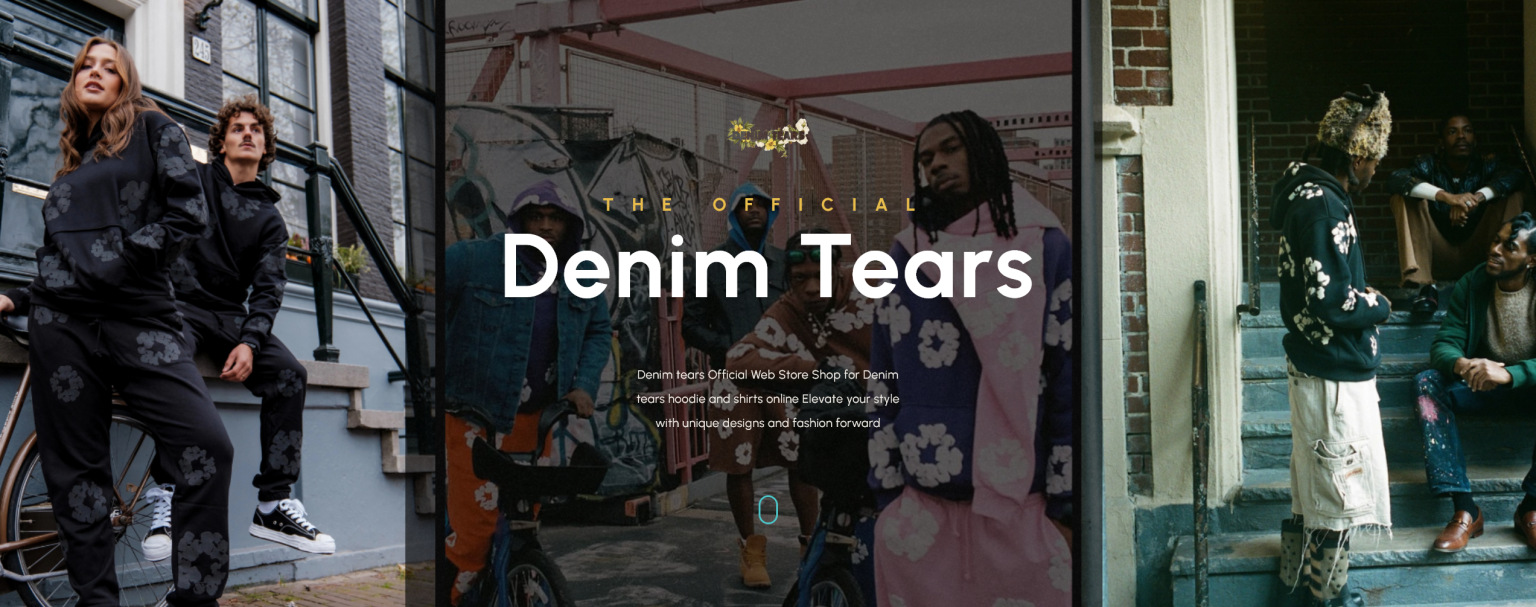Denim Tears: The Uniform of Resistance

In the landscape of contemporary fashion, few brands have managed to blur the lines between style, denim tear culture, and activism as seamlessly as Denim Tears. Founded by Tremaine Emory in 2019, the brand is not just a clothing label—it is a powerful social commentary, a historical record, and most importantly, a symbol of resistance. At the heart of Denim Tears lies a mission far greater than aesthetics: to challenge the systems of oppression embedded in Western culture, particularly those tied to the African diaspora and the legacy of slavery. Through symbolic pieces and thoughtful storytelling, Denim Tears has emerged not only as a fashion phenomenon but also as a cultural movement.
A Cultural Foundation: The Roots of Denim Tears
Tremaine Emory, also known as “The Denim Tears,” is more than a designer; he is a storyteller and cultural historian. Having worked behind the scenes with some of the most influential brands and figures in fashion—such as Kanye West, Virgil Abloh, and Marc Jacobs—Emory launched Denim Tears with a vision rooted deeply in the African American experience. His first collection, released on the 400th anniversary of the arrival of the first enslaved Africans in Jamestown, was not coincidental. It marked the beginning of a brand intended to bring visibility and reckoning to a past America often prefers to forget.
The use of cotton as a primary motif in Denim Tears collections is deliberate and poignant. Cotton, the fabric that built the American economy on the backs of enslaved Africans, becomes a metaphor for both pain and resilience. Denim Tears reclaims cotton, transforming it from a symbol of exploitation into one of pride, heritage, and resistance. Through this act, the brand encourages consumers to engage with history and rethink their relationship with the clothes they wear.
The Iconic Cotton Wreath: Fashion as Protest
One of the most recognizable symbols in Denim Tears’ design is the cotton wreath. Frequently printed on denim jeans, sweatshirts, and jackets, the wreath is haunting yet dignified. It evokes the suffering endured by enslaved people forced to labor in cotton fields, yet it is also presented as a crown—an emblem of survival and cultural endurance.
This stark juxtaposition turns each Denim Tears garment into a walking monument. Emory’s work is reminiscent of artistic protest, where fashion becomes a medium for truth-telling and healing. Each piece serves as a form of quiet rebellion, inviting wearers and onlookers alike to reflect on uncomfortable histories and engage in meaningful dialogue.
In this way, Denim Tears operates not only within the realms of streetwear and luxury fashion but also within the broader context of political resistance. The garments tell stories that textbooks often sanitize or omit entirely. They are conversation starters, subversive tools, and pieces of wearable activism that reject the idea of fashion as apolitical.
Bridging Communities and Generations
A key strength of Denim Tears lies in its ability to transcend generations and resonate with diverse audiences. While the brand is rooted in African American history, its messaging about resistance, identity, and liberation speaks to a global audience grappling with systemic injustice.
Emory frequently collaborates with artists, musicians, and institutions that align with his vision. Partnerships with brands like Levi’s, UGG, and Dior have introduced Denim Tears to broader markets, amplifying its message without diluting its core values. For instance, the Levi’s x Denim Tears collaboration, which features jeans adorned with the signature cotton wreath, represents a significant reclamation of one of America’s most iconic clothing brands by descendants of those who made the fabric possible.
Moreover, Emory’s projects often fuse past and present, combining historical narratives with modern cultural references. This duality keeps the brand grounded in its purpose while remaining fresh and relevant. It speaks to older generations who remember the civil rights era and younger ones engaging with contemporary social movements like Black Lives Matter. In doing so, Denim Tears becomes a cultural bridge—connecting timelines, people, and ideas.
The Uniform of Resistance: Wearing Meaning
In an era where fast fashion dominates and style often overshadows substance, Denim Tears offers an alternative. The brand’s tagline, “The Uniform of Resistance,” isn’t just a slogan—it’s a call to consciousness. Emory’s clothing urges us to consider not only how we dress but why we dress the way we do. What histories do our garments carry? What do we communicate when we wear certain symbols?
This idea elevates Denim Tears from fashion to philosophy. By donning a Denim Tears jacket or a pair of its signature jeans, wearers become part of a narrative larger than themselves. They join a collective that values remembrance, justice, and transformation. They wear history not as a burden but as a badge of resilience.
Furthermore, in the context of contemporary protests and socio-political activism, Denim Tears provides a kind of visual unity. It becomes armor for those who challenge the status quo, a cultural shorthand for shared values, and a form of resistance that speaks without shouting. It reminds us that fashion can be more than trend—it can be truth.
The Future of Denim Tears
As Denim Tears continues to grow, it remains steadfast in its mission. Emory has expressed interest in expanding the brand’s reach without compromising its message. This includes more collaborations, educational initiatives, and possibly a deeper integration with art institutions and cultural centers.
What makes Denim Tears remarkable is its commitment to not just selling clothes, but shifting consciousness. In a world increasingly driven by image and immediacy, it offers depth and reflection. It invites us to pause and look at the past—not with shame, but with clarity and intention.
Tremaine Emory is also invested in building a legacy that goes beyond garments. By incorporating storytelling, visual art, and historical references into his collections, he is laying the foundation for Denim Tears to become a lasting cultural institution. It’s not about seasonal drops—it’s about shaping how we remember and what we choose to honor.
Conclusion: More Than a Brand
Denim Tears is not merely a fashion brand—it is a movement, a statement, a reclamation. Through symbolic design, Denim Tears Hoodie historical reckoning, and an unwavering commitment to truth, it transforms clothing into a medium of resistance. Tremaine Emory’s vision reminds us that what we wear can carry meaning far beyond trends and that fashion can serve as a powerful tool for justice, memory, and collective healing.
In a time where authenticity is rare and commodification is rampant, Denim Tears stands as a beacon—an example of how art, history, and fashion can come together to inspire real change. It asks us to not only look good, but to look deeper.








